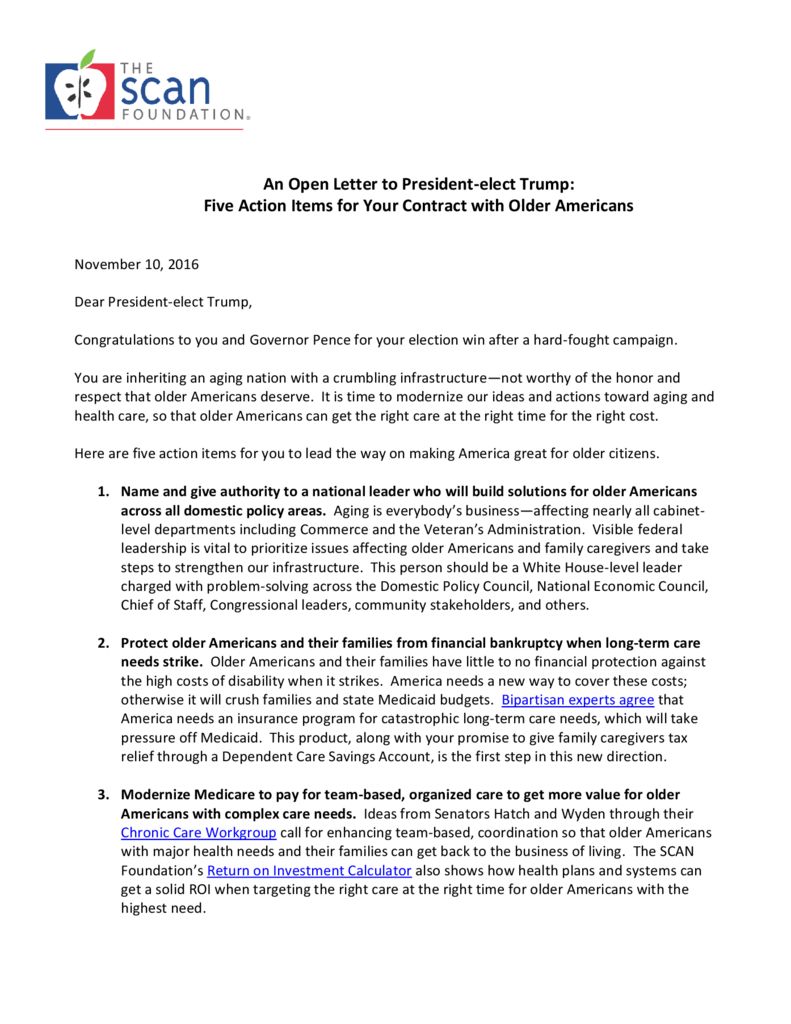An Open Letter to President-elect Trump: Five Action Items for Your Contract with Older Americans
summary
Immediately following the 2016 presidential election, Dr. Chernof wrote a letter to then President-elect Trump describing five action items for supporting older Americans.
Date Updated: 11/10/2016Dear President-elect Trump,
Congratulations to you and Governor Pence for your election win after a hard-fought campaign.
You are inheriting an aging nation with a crumbling infrastructure—not worthy of the honor and respect that older Americans deserve. It is time to modernize our ideas and actions toward aging and health care, so that older Americans can get the right care at the right time for the right cost.
Here are five action items for you to lead the way on making America great for older citizens:
- Name and give authority to a national leader who will build solutions for older Americans across all domestic policy areas. Aging is everybody’s business—affecting nearly all cabinet-level departments including Commerce and the Veteran’s Administration. Visible federal leadership is vital to prioritize issues affecting older Americans and family caregivers and take steps to strengthen our infrastructure. This person should be a White House-level leader charged with problem-solving across the Domestic Policy Council, National Economic Council, Chief of Staff, Congressional leaders, community stakeholders, and others.
- Protect older Americans and their families from financial bankruptcy when long-term care needs strike. Older Americans and their families have little to no financial protection against the high costs of disability when it strikes. America needs a new way to cover these costs; otherwise it will crush families and state Medicaid budgets. Bipartisan experts agree that America needs an insurance program for catastrophic long-term care needs, which will take pressure off Medicaid. This product, along with your promise to give family caregivers tax relief through a Dependent Care Savings Account, is the first step in this new direction.
- Modernize Medicare to pay for team-based, organized care to get more value for older Americans with complex care needs. Ideas from Senators Hatch and Wyden through their CHRONIC Care Workgroup call for enhancing team-based, coordination so that older Americans with major health needs and their families can get back to the business of living. The SCAN Foundation’s Return on Investment Calculator also shows how health plans and systems can get a solid ROI when targeting the right care at the right time for older Americans with the highest need.
- Accelerate federal and state efforts to integrate Medicare and Medicaid. When people have Medicare and Medicaid, they are crushed under the weight of separate program rules that end up giving people inadequate care and costing the government more money. Bipartisan experts agree that we can do better by aligning these programs in ways that improve care and lower overall costs. We urge you to accelerate integration efforts that have already begun in over a dozen states.
- Build new ways to measure health care quality based on what older Americans want. It is time to redefine health care quality—focusing on what is most important to the person actually getting the care. Experts from all sectors agree on these four essential attributes of a high quality system of care that is from the person’s perspective. We urge you to use this as the guidepost to build new quality measures to reward plans for focusing back on their customer—older Americans and their families.
For more ideas on how to make America great for older Americans, please reach out to us at www.TheSCANFoundation.org.
Sincerely,

Bruce A. Chernof, MD
President and CEO
Continue Reading
This policy brief provides an introduction to The SCAN Foundation’s CLASS Technical Assistance Brief Series, which explores many of the critical issues to be considered for successfully implementing CLASS.
This policy brief describes the broad needs of individuals with disability and the wide range of supportive and environmental solutions that can allow for the most independent living possible. It suggests how findings on social and environmental supports for individuals with disability can inform implementation of CLASS.
This policy brief provides background on the historical development of benefit eligibility triggers in the private long-term care insurance market. Understanding how these triggers came into being can provide important information to those charged with implementing the CLASS Plan.


